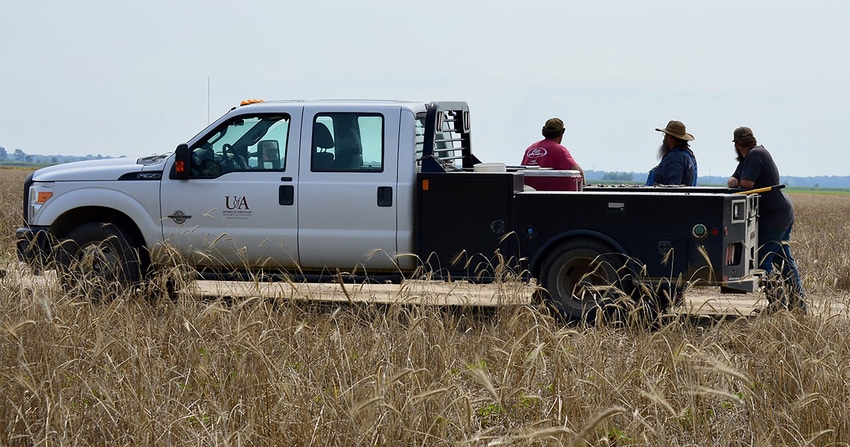
Farmers and ranchers are resilient problem solvers. They can turn challenges into success with methodical solutions in the face of adversity. While farm work is rewarding, it also comes with a high level of stress.
Research over the years has brought attention to occupational stress and mental health within the ag industry. Conversations on the topic are more common these days, with more resources and assistance available for farmers and ranchers.
 Brittney Schrick, Assistant Professor and Family Life Specialist for the University of Arkansas System Division of Agriculture. (Arkansas Cooperative Extension Service)
Brittney Schrick, Assistant Professor and Family Life Specialist for the University of Arkansas System Division of Agriculture. (Arkansas Cooperative Extension Service)
Brittney Schrick, assistant professor and family life specialist for the University of Arkansas System Division of Agriculture, says, “When it comes down to it, you (the farmer) are the most important resource on your farm. Taking care of your body, mind, and spirit are all investments in your operation.”
Self-Awareness is Key
Farmers know the unique stressors involved in taking care of the land, livestock, and livelihood of their operations.
In addition, we just plowed through the COVID-19 pandemic, and farmers are dealing with the aftermath of the 2022 drought. Each bringing new stressors to the farm.
Stress happens, and the signs can easily be missed when caught up in daily routines and uncontrollable conditions.
“It can cause changes in the way we feel physically and emotionally, and stress can also impact how we act. You may not realize how stressed you are until you do not feel well, so pay attention to the red flags,” she said.
Signs of stress may include:
Headaches, muscle tension
Upset stomach, GI issues
Lack of energy, fatigue
Shortness of breath, chest tightness
Irritability, frustration
Anger outbursts
Difficulty relaxing or sleeping
Feeling hopeless, discouraged
Anxiety, panic
Difficulty making decisions
Conflicts and difficulty communicating
Increased or inappropriate alcohol or substance use
Isolation and avoiding others
If you experience any of these symptoms, check in with yourself. Determine if they are related to your stress level so you can take measures to get it under control. You may notice these signs in someone close to you, so take an opportunity to reach out and offer support.
Responding to Stress
While you cannot control the weather, the supply chain, or rising input costs, you can control how you respond.
Schrick noted, "In the midst of intense stress, it can feel overwhelming and out of control. So, it is important to focus on what we can control rather than what we cannot.”
To do this, Schrick suggests making a list of current stressors and identifying the resources available to meet them. Then use the list to develop goals.
Goal setting can shift attitudes from worry to problem-solving. Just be sure your goals are realistic. Otherwise, the process becomes counterproductive.
She emphasized, “One of the most stress-inducing things we can do is to set unrealistic goals and get upset when they are not met."
Also, be aware of your stress level when responding to others or particularly trying situations. Negative responses from frustration or irritability may cause more damage to be repaired in the long run.
“Take a deep breath before you reply to someone to avoid using an irritable tone. If you are frustrated while fixing something, stop for a minute to gather your thoughts. Maybe take a walk.
“It will be easier to calm down and go back to it, rather than break something in frustration and have more problems to fix later,” said Schrick.
Healthy Lifestyle Choices
Incorporating healthy lifestyle choices can build strength, health, and productivity in your operation.
Manage your stress level and improve your sleep quality by:
Eating a balanced diet with a variety of foods
Getting some exercise, even if it is taking a walk around the field
Staying hydrated
Setting aside time to talk with others
Laughing, because it releases endorphins
Taking five minutes to unwind in the evening to avoid crashing in exhaustion at bedtime
Stretch, read a book, or make a list
Meditate, pray, or practice deep breathing
Additionally, Schrick warns against relying on stimulants or substances to cope with stress.
“Try to limit them as much as possible. The more coffee or tobacco you ingest, the more your anxiety will ramp up. You may not realize you are jittery from excess coffee until you stop drinking so much,” she said.
Addictive behaviors, such as excessive alcohol use and taking prescription medications off-label, should also be avoided. If you find yourself using stimulants and substances to cope, know that there are better options and help is available.
Farming tends to be an isolated job. Find time to talk with friends and family members and check in with others in your ag community. Social interaction can make a big difference.
Resources and Assistance
Mental health services are resources widely available to farmers and ranchers. In the southern region of the United States, funding comes through the Southern Ag Exchange Network (SAGE), provided by the 2018 farm bill through the farm and ranch stress assistance network.
“These programs work to increase the capacity to meet community needs for training related to mental health," she said, noting the training is not just for those with occupations in agriculture. “We want to train folks in communities who work, live, and interact daily with farmers and ranchers. Knowing the red flags can equip them to intervene and point ag workers to the right resources.”
Schrick specifically referred to programs offered by the Arkansas Cooperative Extension Service.
QPR (Question, Persuade, Refer) is a one-hour, no-cost program focused on suicide prevention. The training is open to anyone in the state, with 14 trained facilitators.
Mental Health First Aid is an in-depth, full-day program covering broad topics related to mental health where participants learn to assist someone in a crisis.
Another option for Arkansans is AR Connect Now, a no-cost, comprehensive behavioral health treatment program offered by the University of Arkansas for Medical Sciences (UAMS). A call center is open 24/7. The program connects you with resources and professionals. No insurance is required, and tele-video visits are available.
Schrick added, “Increased access to telemedicine is one of the positive things that came out of the COVID pandemic. You can sit in the cab of your truck or tractor and get advice from a physician or mental health specialist.”
Each Delta state has resources to promote mental well-being in the ag industry. Contact your cooperative extension service or the department of agriculture in your state for programs specific to your area.
For immediate support, call or text 988 to reach the Suicide and Crisis Lifeline.
About the Author(s)
You May Also Like






